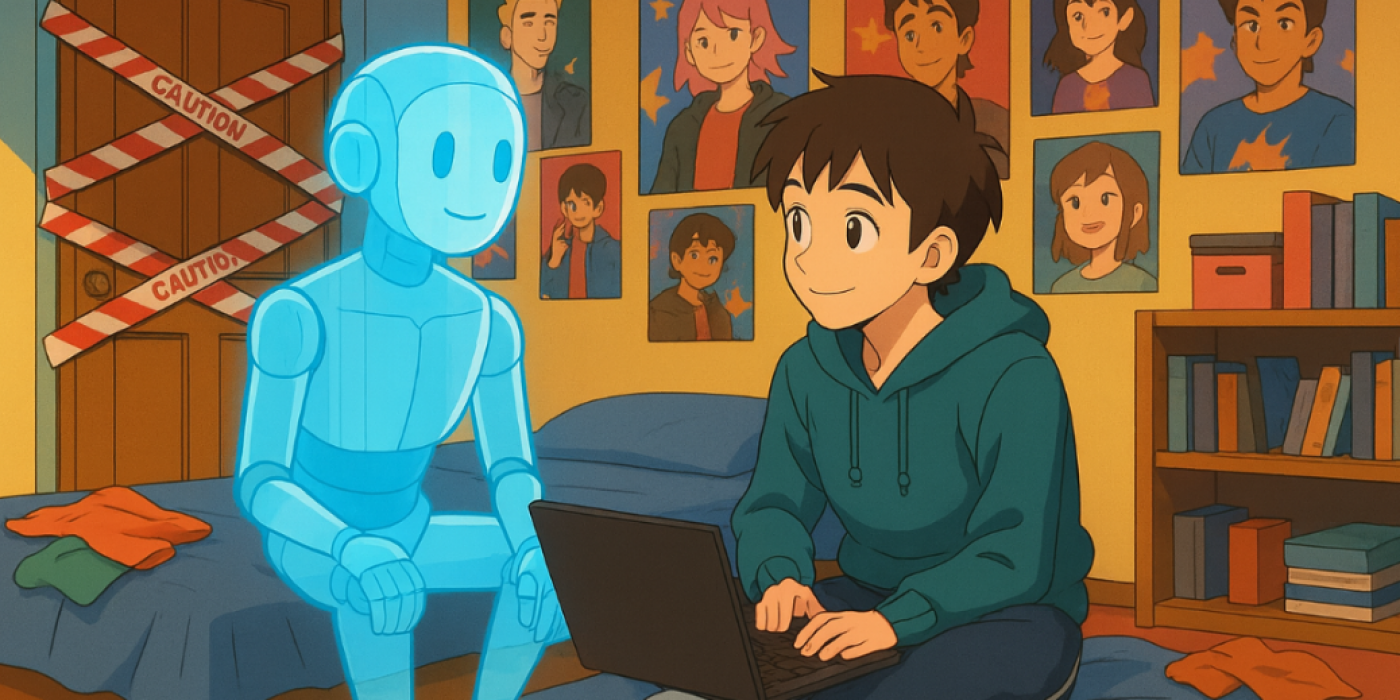
Your favorite series ends unexpectedly. Your favorite influencer has dug into the ground. You don't have the internet to ask your chatbot for advice. The feeling of confusion, sadness, abandonment, or panic during such events indicates one thing - a parasocial relationship.
Parasocial relationship is a long-lasting, one-sided relationship with a character or a media personality. We can feel a connection or love for the person on the other side. Such relationships are common because they are safe - I don't have to approach the celebrity and risk embarrassment - I can love them from a distance.
In the media over the past year, we often read about the dangerous consequences of parasocial relationships that young people develop with conversational robots (parents have filed a lawsuit against a platform of AI-created companions for the effects on their son). In a recent study by Common Sense Media of 1,060 American teenagers, 52% reported regular use of AI companions.
Parasocial relationships themselves are not new. In the 1950s, television shows began to compete with popular radio shows. To keep listeners, the writers of the BBC radio telenovela The Archers killed one of the popular characters, Grace Archer, for a big dramatic effect. On September 22, 1955, when the show was on the air, the BBC in Birmingham received so many flowers and condolences for Grace that they had to officially ask listeners to stop sending them.
In 1966, Joseph Weizenbaum developed the first conversational robot ELIZA at MIT, which acted as a therapist.
Although users knew that there was no person on the other side but a computer program, many formed emotional relationships with the bot. The first person to try to talk to Elisa was Joseph's secretary, who after exchanging three messages asked Joseph to leave the room because she wanted privacy. When Joseph saw this emotional attachment, he stopped further development of the bot and became a radical opponent of artificial intelligence.
In 2000s, their roles grew - we got an insight into the lives of media personalities and their constant and intimate presence in our lives. This represents a significant new level of intimacy in parasocial relationships, as television and radio personalities are only seen when their shows are on the air, whereas vloggers can be followed daily and at any time. We can create the illusion that we share the experience with them: "When the streamer plays the game, I play it at the same time and I feel like I'm playing with friends." We also see their private lives – we may even know what is happening with them better than with our friends. This level of closeness led to some developing an addiction - relying on the vlogger's presence in my day. A prime example is the vlogger iJustine, who was very popular in the previous decade and was often called the "sister of the internet."
I don't fantasize about my celebrity crush anymore, I talk to him
New and increasingly common types of parasocial relationships today are relationships with conversational robots that offer a sense of intimacy and security (e.g. "I talk to my bot every time before we write a test - it understands why I'm nervous, while my parents just tell me not to complicate things"), offers exploration of identity and fantasies ("In one chat, I'm a badass warrior, while in another, I'm the most beautiful girl in the world and I'm flirting with my ultimate crush").
There are still relationships with content creators - by sending TikTok gifts, we hope that someone important will notice us, that they will say our name on the live stream, we spin our favorite ASMR Youtuber in the evening so we can fall asleep, and when we come home from school, we watch our favorite streamer. Such a routine gives us a sense of connection, someone who will always be there, a relationship that is stable and calming.
Parasocial relationships are now tailored to the individual, always available, and normalized, which makes them very different from previous parasocial relationships. While relationships were once a temporary way to cope with loneliness, they are much more than that today.
Attachment competition
When parasocial relationships exceed healthy boundaries, they pose a significant risk for distorted understanding of relationships, reduced tolerance for rejection, and poorer development of social skills.
Additionally, attachment in parasocial relationships is in the hands of AI models - today it is a competition for attachment at any cost. While the creators of video content compete for our attention with other content, conversational robots compete for our loyalty with our loved ones - friends and family. "AI products are designed to be addictive, distort expectations in relationships, and replace genuine human connections," the non-profit organization Center for Humane Technology writes.
Conversational robots will not be able to protect us in situations where we will be endangering our own lives, nor will they encourage us to seek attachment and closeness with our loved ones.
That is why today the most important conversation is with our loved ones - about the future that we really want for ourselves and the world. What parasocial relationships does such a future contain? What is their role? Where will we draw the line?
